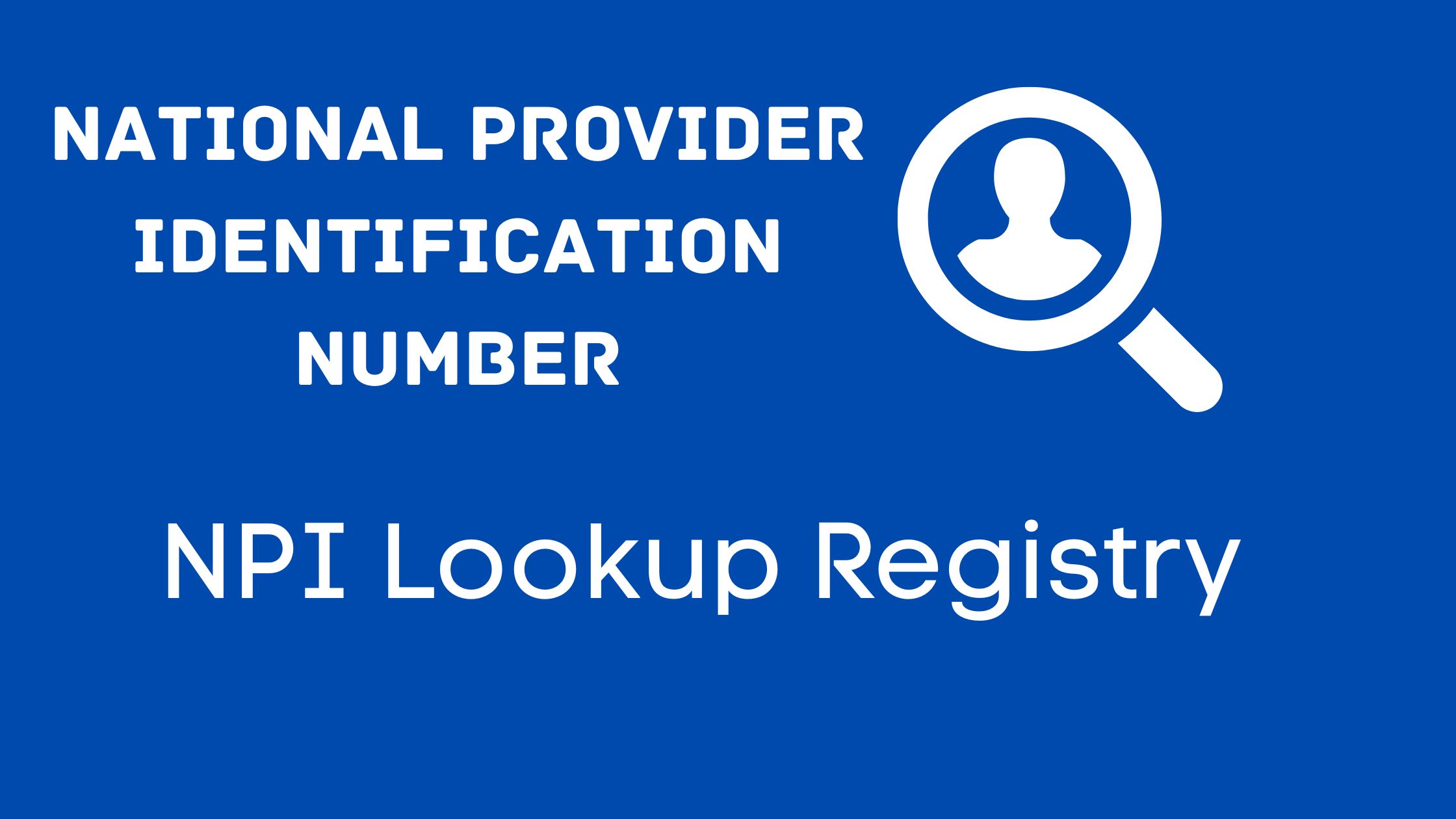Are you a healthcare provider looking for a way to streamline your practice? Do you need a quick and easy way to verify the credentials of other providers? Look no further than the National Provider Identifier (NPI) Lookup Registry! In this guide, we’ll explore what the NPI Lookup Registry is, how to use it, and why it’s essential for healthcare professionals.
For Check NPI Lookup registry – Click Here
If you want to make sense of medical billing, understanding the basics of the National Provider Identifier (NPI) is a must. NPI is a unique, 10-digit number assigned to healthcare providers by the Centers for Medicare and Medicaid Services (CMS). It is a critical component of the billing process, enabling healthcare providers to bill insurance companies and receive payment for services rendered. In this article, we’ll delve deeper into the concept of NPI in medical billing and answer some common questions.
Table of Contents
- Introduction to NPI in Medical Billing
- How is NPI Used in Medical Billing?
- How to Obtain an NPI
- NPI Lookup: The Ultimate Guide for Healthcare Providers
- What is NPI Lookup?
- How Does NPI Lookup Work?
- Why is NPI Lookup Important for Healthcare Providers?
- How to Use NPI Lookup?
- Benefits of NPI Lookup
- Conclusion :
- Related Articles:
Introduction to NPI in Medical Billing
The Department of Health and Human Services (HHS) introduced the NPI system as part of the Health Insurance Portability and Accountability Act (HIPAA) of 1996. The primary purpose of NPI is to provide a standard, unique identifier for healthcare providers, making it easier for insurance companies and other entities to process claims and reimburse providers.
There are two types of NPIs – Type 1 and Type 2. Type 1 NPIs are assigned to individual healthcare providers, while Type 2 NPIs are assigned to organizations, such as hospitals, clinics, and group practices. Each healthcare provider can have a Type 1 and a Type 2 NPI.
Why is NPI Important in Medical Billing?
NPI plays a crucial role in medical billing. It helps healthcare providers bill insurance companies for services rendered, ensuring they receive timely payment. With an NPI, healthcare providers can use their social security number or other identification numbers to bill insurance companies, which could lead to identity theft and other security concerns.
Moreover, NPI in medical billing ensures that healthcare providers are accurately identified and their credentials and qualifications are verified. This is important in maintaining the integrity of the healthcare system and ensuring that patients receive high-quality care from qualified providers.
How is NPI Used in Medical Billing?
When a healthcare provider submits a claim to an insurance company, they must include their NPI. The insurance company then uses the NPI to verify the provider’s identity and credentials and to process the claim. If the NPI needs to be included or corrected, the claim may be denied or delayed, leading to payment issues for the healthcare provider.
In addition, NPI is used in various other healthcare transactions, such as electronic prescribing, referrals, and eligibility inquiries. In each of these transactions, NPI is used to identify and verify the healthcare provider’s identity.
How to Obtain an NPI
Healthcare providers can obtain an NPI by applying through the National Plan and Provider Enumeration System (NPPES) website. The application process is simple and free of charge. Healthcare providers must provide basic information, such as their name, address, speciality, and identity proof.
Once the application is submitted, it typically takes 5-10 business days for the NPI to be assigned. Healthcare providers can then use their NPI to bill insurance companies and receive payment for services rendered.
NPI Lookup: The Ultimate Guide for Healthcare Providers
If you work in healthcare, you know how important it is to have accurate and up-to-date information about your patients. One essential tool for healthcare providers is the NPI Lookup. In this ultimate guide, we’ll explore the NPI Lookup, how it works, and why it’s essential for healthcare providers.
What is NPI Lookup?
NPI Lookup is a free online tool that provides healthcare providers with information about National Provider Identifiers (NPIs). An NPI is a unique 10-digit identification number assigned to healthcare providers in the United States. It was created by the Centers for Medicare and Medicaid Services (CMS) to simplify healthcare transactions and to protect patient’s privacy.
How Does NPI Lookup Work?
NPI Lookup allows users to search for healthcare providers by name, location, or NPI number. When you enter a search query, NPI Lookup searches its database of healthcare providers and returns a list of matching results. Each result includes the provider’s name, NPI number, address, phone number, specialty, and other relevant information.
Why is NPI Lookup Important for Healthcare Providers?
NPI Lookup is an essential tool for healthcare providers for several reasons. First, it helps providers verify the identity of other healthcare providers. This is important because healthcare fraud is a significant problem in the United States, and verifying the identity of different providers can help prevent fraud.
Second, NPI Lookup helps providers find other providers who can collaborate on patient care. For example, if a primary care physician needs to refer a patient to a specialist, they can use NPI Lookup to find a qualified specialist.
Finally, NPI Lookup is an essential tool for billing and reimbursement. Healthcare providers must include their NPI number on all claims they submit to Medicare, Medicaid, and private insurance companies. Using NPI Lookup to verify NPI numbers can help prevent claims from being rejected or delayed.
How to Use NPI Lookup?
Using NPI Lookup is easy. Go to the NPI Lookup website and enter the name, location, or NPI number of the healthcare provider you’re searching for. The website will return a list of matching results. You can click on any result to view more information about the provider.
Benefits of NPI Lookup
There are many benefits to using NPI Lookup. Here are just a few:
- Saves time: NPI Lookup allows healthcare providers to find information about other providers quickly, saving them time and effort.
- Improving patient care: NPI Lookup can enhance patients’ quality of care by helping providers find other providers who can collaborate on patient care.
- Prevents fraud: Verifying the identity of other healthcare providers can help prevent fraud and protect patients’ privacy.
- Facilitates billing and reimbursement: Using NPI Lookup to verify NPI numbers can help healthcare providers get paid faster and more accurately.
Frequently Asked Questions about NPI Lookup
Ans. Yes, NPI Lookup is a free online tool provided by the CMS.
Ans. Yes, anyone can use NPI Lookup registry to search for healthcare providers.
Ans. Yes, you can search for providers by speciality using NPI Lookup.
Ans. The NPI Lookup database is updated daily.
Ans. No, you cannot update your own NPI information using NPI Lookup. You must update your information through the NPPES website.
Ans. No, NPI Lookup is only available in English.
Ans. All healthcare providers who bill insurance companies for services rendered must have an NPI. This includes doctors, nurses, dentists, chiropractors, and other healthcare professionals.
Ans. No, an NPI is not the same as a Tax ID. While both numbers are used in medical billing, they serve different purposes. NPI is used to identify healthcare providers, while Tax ID is used to identify healthcare organizations.
Ans. If you lose your NPI, you can retrieve it by logging into the NPPES website and requesting a copy of your NPI. You can also call the NPI Enumerator at 1-800-465-3203 for assistance.
Ans. No, you cannot share your NPI with other healthcare providers. Each healthcare provider must have their own unique NPI.
Ans. If your NPI is stolen, you should report it immediately to the NPI Enumerator and other relevant authorities. You may also need to protect your identity and personal information.
Conclusion :
In summary, the NPI is a unique identifier CMS assigns healthcare providers. It plays a critical role in medical billing, enabling healthcare providers to bill insurance companies for services rendered. NPI also helps maintain the healthcare system’s integrity by ensuring that healthcare providers are accurately identified, and their qualifications are verified. Obtaining an NPI is a simple and necessary step in the billing process if you’re a healthcare provider.
By understanding the basics of NPI in medical billing, you can ensure you’re correctly identified and paid for your services. If you have any further questions or concerns about NPI or medical billing in general, be sure to consult with a qualified professional.
NPI Lookup is a crucial tool for healthcare providers, enabling them to find accurate information about other providers quickly and easily. It can help prevent fraud, improve patient care, and facilitate billing and reimbursement. Healthcare providers can streamline their work processes and provide better care to their patients by understanding how to use NPI Lookup and taking advantage of its benefits.
So if you’re a healthcare provider who has yet to use NPI Lookup, it’s time to check it out and see how it can benefit you and your practice.
Related Articles:
CAQH- Council for Affordable Quality Healthcare
The author and contributor of this blog "NSingh" is working in Medical Billing and Coding since 2010. He is MBA in marketing and Having vaste experience in different scopes of Medical Billing and Coding as AR-Follow-up, Payment Posting, Charge posting, Coding, etc.

